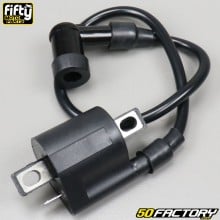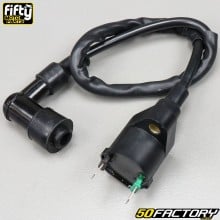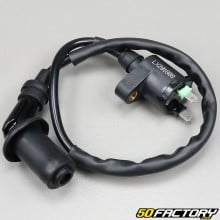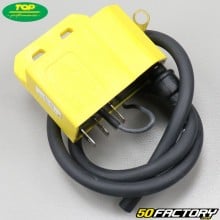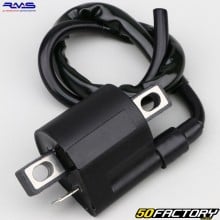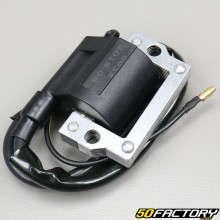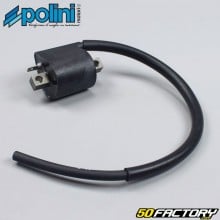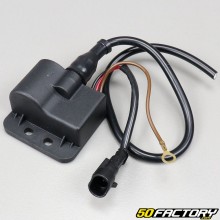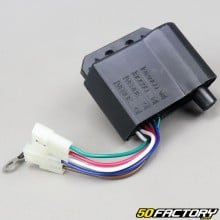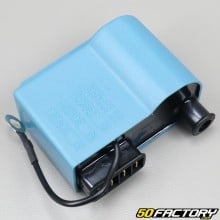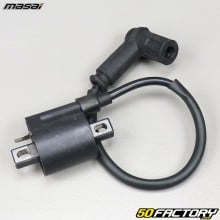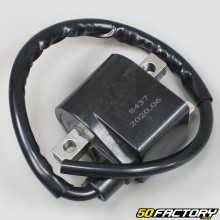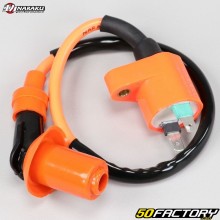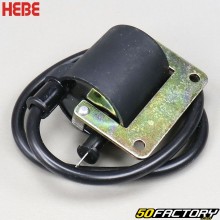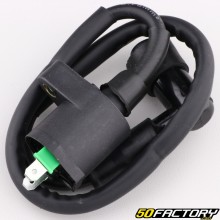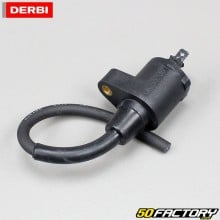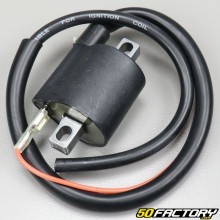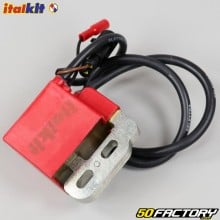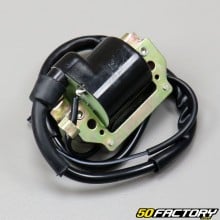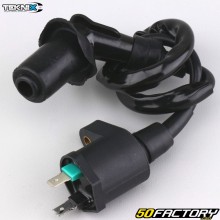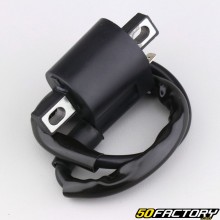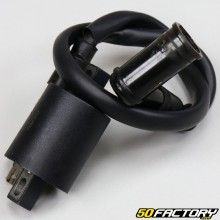 Ignition coil
Ignition coil
 Ignition coil
Ignition coil
-
-
-
- STOCK EXHAUSTED10€60
-
- IN STOCK41€80
- STOCK EXHAUSTED7€70
-
- IN STOCK53€00
- IN STOCK46€90
-
- IN STOCK23€90
-
- IN STOCK38€60
-
- IN STOCK59€80
- IN STOCK36€50
-
-
- IN STOCK10€10
- IN STOCK14€00
-
- IN STOCK13€80
-
- IN STOCK24€00
- STOCK EXHAUSTED10€60
-
-
-
- STOCK EXHAUSTED10€80
-
- IN STOCK18€90
-
-
-
-
-
- IN STOCK276€80
- IN STOCK17€90
Understanding the Ignition Coil for a 50cc Motorcycle
La 50cc motorcycle ignition coil is a crucial component of your two-wheeler's ignition system. Its mission is to transform the low voltage of the battery (usually 12 volts) into a high voltage (up to 30 volts) necessary to create a spark at the spark plug. This spark is essential to ignite the air-fuel mixture in the engine cylinder, thus allowing it to start and operate properly.
Its importance for the proper functioning of the motorcycle
Without a working ignition coil, your 50cc motorcycle will have difficulty starting, maintaining optimal performance, and could even break down. In fact, a failure of this part can cause a range of problems, from a loss of power to excessive fuel consumption. Therefore, understanding its role and ensuring its proper maintenance is crucial to ensuring the reliability and durability of your vehicle.
The different types of these components for 50cc motorcycles
Features and specifications
There are several types of ignition coils suitable for 50cc motorcycles, each with its own characteristics and advantages. Here are the main types available:
- Classic reels: Also called canister coils, they consist of a primary and secondary winding around an iron core. They are durable and relatively easy to replace.
- Modern reels: These coils use more advanced technologies, such as multiplexed or twin spark coils, providing better performance and extended life.
Choosing the right type for your vehicle
The choice of ignition coil depends on several factors, including the model of your 50cc motorcycle, the intended use (daily riding, competitions, etc.) and your personal preferences in terms of performance. To select the right coil, it is recommended to consult your vehicle's manual or seek advice from an expert. At 50 Factory, we offer a wide range of ignition coils suitable for different models and needs.
Identify a failure of this part
Signs of failure
How do I know if my coil is dead on my 50cc model?
Signs of a bad ignition coil can be varied. Here are some common symptoms:
- Difficulty starting the engine
- Power loss
- Misfires
- Excessive engine vibration
- Excessive fuel consumption
What are the symptoms of a faulty coil?
Aside from the symptoms mentioned above, a faulty coil can also cause jerking while driving and overheating of the engine. If you notice any of these signs, it is crucial to check the condition of your ignition coil to avoid more serious damage.
Consequences of a failure on the operation of the two-wheeler
Can I ride with a faulty coil?
Riding with a faulty ignition coil is not recommended. Not only can it make your motorcycle difficult to start, but it can also cause performance issues, excessive fuel consumption, and damage to other engine components. If it fails, it is best to replace the coil as soon as possible to avoid costly repairs and ensure your riding safety.
Replacing this part on a 50cc vehicle
When should this component be replaced?
There is no fixed lifespan for an ignition coil, car It depends on various factors such as vehicle usage and driving conditions. However, it is generally advisable to check the condition of the coil every 100 to 000 kilometers. If you experience problems such as difficulty starting or loss of power, it is recommended to check and replace the coil if necessary.
Steps to replace this unit
Replacing an ignition coil may seem complex, but by following these steps you can do it yourself:
- Disconnect the battery to avoid the risk of electric shock.
- Locate the ignition coil and disconnect the wires from the spark plug and distributor.
- Remove any screws or fasteners holding the coil in place.
- Remove the old coil and install the new one following the manufacturer's instructions.
- Reconnect the spark plug and distributor wires, then reconnect the battery.
Tools needed for replacement
To replace an ignition coil you will need the following tools:
- Socket wrench
- Screwdriver
- Multimeter (to test the new coil)
- Protective gloves
Precautions to take when replacing
When replacing the ignition coil, it is important to follow certain precautions:
- Make sure the motorcycle is turned off and the battery is disconnected.
- Handle electrical components with care to avoid damage.
- Use proper tools to avoid damaging screws and fasteners.
- Follow the manufacturer's instructions to ensure proper installation.
Frequently asked questions about this essential piece
Questions about choosing the unit
What is the best ignition coil for my 50cc motorcycle? The best ignition coil depends on your motorcycle model, performance needs and durability. At 50 Factory, we offer a wide selection of high quality coils suitable for different models.
How do I know if a coil is compatible with my motorcycle? To check compatibility, consult your motorcycle manual or ask an expert for advice. You can also use the search filters on our site to find coils specific to your model.
Questions about installation and replacement
Is it difficult to replace an ignition coil yourself? With the right tools and by following the instructions, replacing an ignition coil is within the reach of even the most amateur mechanic. However, if you are unsure of your skills, it is best to call a professional.
How often should I check my ignition coil? It is recommended to check the condition of the coil every 100 to 000 kilometers or if you experience starting or performance problems.
Make the best choice with our company
The quality of the components offered par our brand
At 50 Factory, we are proud to offer high quality ignition coils, selected from the best brands on the market. Our products are designed to provide optimum performance and maximum durability, ensuring the reliability of your 50cc motorcycle.
Browse our catalog to find the right unit
Explore our extensive catalog of ignition coils for 50cc motorcycles on our website. Use our search filters to easily find the coil compatible with your motorcycle model. Whether you need a classic or modern coil, you will find the product that meets your expectations with us.
The services offered par our company for the purchase of these components
In addition to our wide range of products, we offer fast home or relay point delivery services, a dedicated customer service to answer all your questions, and expert advice to help you choose the ideal ignition coil for your 50cc motorcycle. Also take advantage of our competitive prices and our promotions to get the best value for money.
Consider checking out the other 50cc ignition parts categories to find all your items: suppressors and candle wire, CDI case, spark plug , stator and ignition rotor.








































